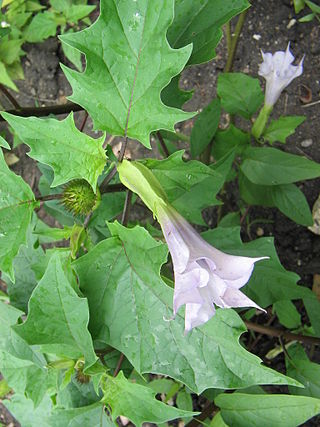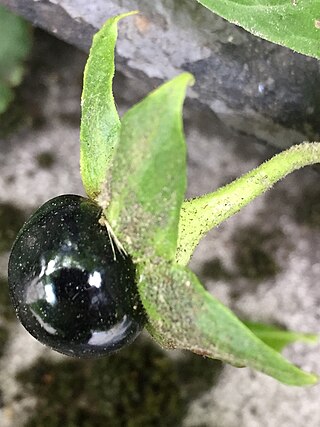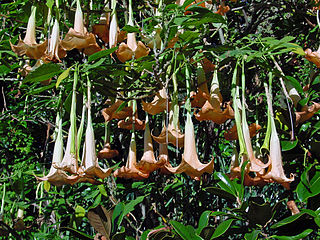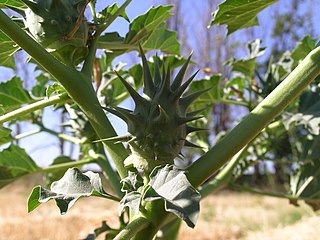
Datura is a genus of nine species of highly poisonous, vespertine-flowering plants belonging to the nightshade family Solanaceae. They are commonly known as thornapples or jimsonweeds, but are also known as devil's trumpets. Other English common names include moonflower, devil's weed, and hell's bells. All species of Datura are extremely poisonous and potentially psychoactive, especially their seeds and flowers, which can cause respiratory depression, arrhythmias, fever, delirium, hallucinations, anticholinergic syndrome, psychosis, and even death if taken internally.

Datura stramonium, known by the common names thorn apple, jimsonweed, devil's snare, or devil's trumpet, is a poisonous flowering plant of the nightshade family Solanaceae. It is a species belonging to the Datura genus and Daturae tribe. Its likely origin was in Central America, and it has been introduced in many world regions. It is an aggressive invasive weed in temperate climates across the world. D. stramonium has frequently been employed in traditional medicine to treat a variety of ailments. It has also been used as a hallucinogen, taken entheogenically to cause intense, sacred or occult visions. It is unlikely ever to become a major drug of abuse owing to effects upon both mind and body frequently perceived as being highly unpleasant, giving rise to a state of profound and long-lasting disorientation or delirium with a potentially fatal outcome. It contains tropane alkaloids which are responsible for the psychoactive effects, and may be severely toxic.

Datura wrightii, commonly known as sacred datura, is a poisonous perennial plant species and ornamental flower of the family Solanaceae native to the Southwestern United States and northwestern Mexico. It is sometimes used as a hallucinogen due to its psychoactive alkaloids. D. wrightii is classified as an anticholinergic deliriant.
Angel's trumpet may refer to:

Brugmansia is a genus of seven species of flowering plants in the nightshade family Solanaceae. They are woody trees or shrubs, with pendulous flowers, and have no spines on their fruit. Their large, fragrant flowers give them their common name of angel's trumpets, a name sometimes used for the closely related genus Datura.

Deliriants are a subclass of hallucinogen. The term was coined in the early 1980s to distinguish these drugs from psychedelics and dissociatives such as LSD and ketamine, respectively, due to their primary effect of causing delirium, as opposed to the more lucid and less disturbed states produced by other types of hallucinogens. The term generally refers to anticholinergic drugs, which are substances that inhibit the function of the neurotransmitter acetylcholine. Common examples of deliriants include plants of the genera Datura and Brugmansia as well as higher than recommended dosages of diphenhydramine (Benadryl). A number of plant deliriants such as that of the Solanaceae family, particularly in the Americas have been used by some indigenous cultures to reach delirious and altered states for traditions or rituals, such as rites of passage, divination or communicating with the ancestors. Despite their long history of use, deliriants are the least-studied class of hallucinogens in terms of their behavioral and neurological effects.
Tropane is a nitrogenous bicyclic organic compound. It is mainly known for the other alkaloids derived from it, which include atropine and cocaine, among others. Tropane alkaloids occur in plants of the families Erythroxylaceae and Solanaceae.

Cuscohygrine is a pyrrolidine alkaloid found in coca. It can also be extracted from plants of the family Solanaceae, including Atropa belladonna, Datura innoxia and Datura stramonium. Cuscohygrine usually occurs along with other, more potent alkaloids such as atropine or cocaine.

Datura metel is a shrub-like annual or short-lived, shrubby perennial, commonly known in Europe as Indian thornapple, Hindu Datura, or metel and in the United States as devil's trumpet or angel's trumpet. Datura metel is naturalised in all the warmer countries of the world. It is found notably in India, where it is known by the ancient, Sanskrit-derived, Hindi name dhatūra (धतूरा), from which the genus name Datura is derived.

Datura innoxia, known as pricklyburr, recurved thorn-apple, downy thorn-apple, Indian-apple, lovache, moonflower, nacazcul, toloatzin, toloaxihuitl, tolguache or toloache, is a species of flowering plant in the family Solanaceae. It is more rarely called sacred datura, a common name which is applied more often to the closely related Datura wrightii. It is native to the Southwestern United States, Central and South America, and introduced in Africa, Asia, Australia and Europe. The scientific name is often cited as D. innoxia. When English botanist Philip Miller first described the species in 1768, he misspelled the Latin word innoxia (inoffensive) when naming it D. inoxia. The name Datura meteloides was for some time erroneously applied to some members of the species, but that name has now been abandoned.

Brugmansia aurea, the golden angel's trumpet, is a species of flowering plant in the nightshade family Solanaceae, endemic to Ecuador. Since March 2014, it has been listed as Extinct in the Wild by the IUCN but before that, it was listed as Vulnerable.

Brugmansia versicolor is a species of plant in the family Solanaceae, commonly known as “angel’s trumpets”. They are endemic to Ecuador. Since March 2014, they have been listed as Extinct in the Wild by the IUCN.

Datura ferox, commonly known as long spined thorn apple and fierce thornapple, as well as Angel's-trumpets, is a species of Datura. Like all such species, every part of the plant contains deadly toxins that can kill animals that ingest it. Its fruit, red-brown when ripe, has unusually long thorns or spikes.

Tropane alkaloids are a class of bicyclic [3.2.1] alkaloids and secondary metabolites that contain a tropane ring in their chemical structure. Tropane alkaloids occur naturally in many members of the plant family Solanaceae. Certain tropane alkaloids such as cocaine and scopolamine are notorious for their psychoactive effects, related usage and cultural associations. Particular tropane alkaloids such as these have pharmacological properties and can act as anticholinergics or stimulants.

Solanoideae is a subfamily of the flowering plant family Solanaceae, and is sister to the subfamily Nicotianoideae. Within Solanaceae, Solanoideae contains some of the most economically important genera and species, such as the tomato, potato, eggplant or aubergine, chili and bell peppers, mandrakes, and jimson weed.

Brugmansia arborea, the angel's trumpet, is a species of flowering plant in the family Solanaceae. The IUCN has classed Brugmansia arborea as Extinct in the Wild.

Aposcopolamine (apohyoscine) is a bio-active isolate of Datura ferox and several species of Physochlaina, - plants belonging to the Nightshade family, Solanaceae in which tropane alkaloids are of frequent occurrence, particularly in tribes Datureae and Hyoscyameae.

Leucinodes cordalis, the poroporo fruit borer or eggfruit caterpillar, is a species of moth in the family Crambidae. It is found in New Zealand, Australia and Indonesia (Sulawesi). In Australia, it has been reported from Norfolk Island, the Northern Territory, Queensland, New South Wales, the Australian Capital Territory, Victoria, Tasmania and South Australia. The species was first described by Henry Doubleday in 1843.
Chinese thorn-apple is a common name for several flowering plants in the family Solanaceae and may refer to:

The Solanaceae, or nightshades, are a family of flowering plants that ranges from annual and perennial herbs to vines, lianas, epiphytes, shrubs, and trees, and includes a number of agricultural crops, medicinal plants, spices, weeds, and ornamentals. Many members of the family contain potent alkaloids, and some are highly toxic, but many—including tomatoes, potatoes, eggplant, bell and chili peppers—are used as food. The family belongs to the order Solanales, in the asterid group and class Magnoliopsida (dicotyledons). The Solanaceae consists of about 98 genera and some 2,700 species, with a great diversity of habitats, morphology and ecology.
















